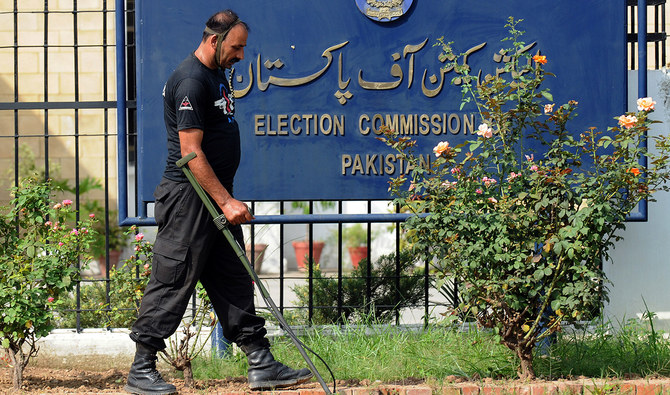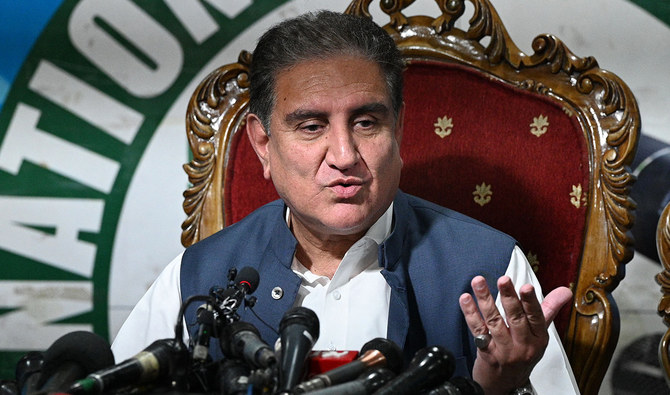ISLAMABAD: Pakistan’s major political parties remain reluctant to hit the campaign trail due to the uncertainty over the election schedule following a notification of the election commission to complete the delimitation of constituencies by December 14 which can delay the national polls.
The general elections in Pakistan are scheduled to be held within 90 days after the dissolution of the National Assembly on August 9, as per the constitution. However, the election commission announced to redraw national and provincial constituencies in keeping with the results of a recent digital census approved by the previous administration of Shehbaz Sharif. The process is likely to take time, surpassing the November deadline for the national polls.
All major political parties, including the Pakistan Tehreek-e-Insaf (PTI) and Pakistan Peoples Party (PPP), have publicly demanded the election commission to hold the polls within the stipulated period, though they remain uncertain about the elections schedule. The country’s top body of lawyers, the Supreme Court Bar Association, also sought the apex court’s intervention this week for national polls to be held within the constitutionally mandated period.
“We have been waiting for the Supreme Court’s decision on the general elections date before starting our election campaign,” Pakistan Peoples Party’s information-secretary Faisal Karim Kundi told Arab News. “We want the election commission to hold the polls within 90 days after the dissolution of the National Assembly.”
Kundi said his party was ready for the elections, “but we don’t want to exhaust our workers without knowing when the elections would be held.”
“One of our teams is working on our manifesto which is expected to be rolled out in couple of weeks,” he said, adding that the PPP would start “active election campaign” to mobilize the public after the election commission would issue a formal schedule for the polls.
“So far, there is no clarity as to when the elections will take place,” he said.
Former prime minister Imran Khan’s PTI party also said it was “not sure” when to kick off the election campaign and mobilize its supporters.
“We have been facing the wrath of the state for being the most popular party in Pakistan,” Sayed Zulfi Bukhari, the ex-premier’s close aide, told Arab News. “Thousands of our workers have been arrested and dozens of senior party leaders are in jails for committing no crime. However, we are ready to take part in the polls.”
He said the PTI had already chalked out a strategy to contest the elections from each constituency across the country despite the “illegal and unconstitutional” crackdown against the party.
“This is a perfect example of pre-poll rigging as our leaders are being forced to switch their loyalty,” he continued. “A fresh wave of crackdown has been unleashed now. So, let’s see how many of our candidates they manage to remove from the party.”
The PTI leader maintained if the election commission failed to hold polls until November, it would be a violation of the constitution.
“The PTI opponents are petrified by its popularity, but we will contest the elections whenever they are held,” he said.
However, the PTI is currently facing multiple challenges, with its chairman and ex-prime minister Khan currently serving a three-year jail term on charges of illegally selling state gifts. He has also been disqualified for five years from holding public office and is now facing a major charge of being in breach of the Official Secrets Act.
Pakistan Muslim League-Nawaz (PML-N) secretary-information in Punjab province, Azma Zahid Bokhari, said her party had been waiting for the return of its founding leader, Nawaz Sharif, from London to kick off its election campaign.
“Nawaz Sharif is expected to return to Pakistan within a month now to lead our election campaign,” she informed.
Sharif has been in London since November 2019 after securing a medical bail following his conviction in a corruption reference. However, he maintains all charges against him are politically motivated and he never indulged in any wrongdoing.
Bokhari said the PML-N leadership was trying to prepare the election manifesto and launch a social media campaign.
“Our party is ready for the polls whenever they are held,” she maintained. “Delay or no delay, it doesn’t matter to us.”
Jamiat Ulema-e-Islam senior leader Shahida Akhtar Ali said her political faction may launch election activities in different constituencies from next month since the “situation remains unclear as to when the elections will be held.”
“The elections should be held within the constitutionally mandated time period,” she told Arab News, adding that her party was finalizing the manifesto and would distribute party tickets after the announcement of election schedule.
Senior leader of Muttahida Qaumi Movement-Pakistan (MQM-P) Syed Amin ul Haque said his party had inaugurated a central election office and was in the process of finalizing the manifesto within a couple of days.
“We have constituted committees at the provincial and district levels to allocate tickets to potential candidates to contest the polls, but we will kick off a formal election campaign after the process of delimitation of constituencies is completed,” he told Arab News.
However, the MQM-P had a different opinion from other political parties on when the general elections could be held.
“The process of delimitation should be completed as early as possible to hold free and fair elections by February next year,” Haque said.

















